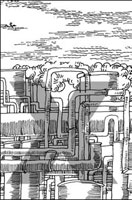I used to think that nothing could block China's change so long as the central government in Beijing had the determination and the money.  This is a government that can put a man in space, and also generate prolonged and widespread changes that people call reform and opening-up. This is a government that can put a man in space, and also generate prolonged and widespread changes that people call reform and opening-up.
But in recent reports about the continuing pollution of the water resources across the country, one can see the limits of the power of a government, no matter how strong it is. And one learns a valuable lesson about how things really work: There will be no change unless Beijing's initiative is followed at the local level - by governments, by communities, and by individuals. A lack of agreement and enthusiasm at the local level with Beijing's environmental campaign is why 2,150 small chemical, and chemical-based processing companies - including paper mills, metal works, and electroplating workshops - still exist in the surrounds of Taihu Lake in the Yangtze Delta. Last week, following another report of the lake's pollution, the provincial government announced that this time small industrial operations would be closed down - but with a grace period from now to the end of 2008. But the lake still has to wait for some time before it can see a marked decrease in pollution. According to local officials, use or rather over-use, of chemical fertilizers in the paddy fields surrounding the lake continues. And, it will not be until 2010 when all lakeside cities will start to commit 3 percent of their gross domestic product (GDP ) - a relatively small amount - to pollution control. It is distressing to hear that 2,000 small chemical companies have managed to keep operating after billions of yuan of public funds have been spent in a decade-long pollution control program for the lake. Considering the fact that the lakeside regions are among China's most wealthy, with cities of Wuxi, Changzhou and Suzhou contributing more than half of Jiangsu's GDP, a province that is considered to be one of the major powerhouses of China's economy, what was promised on environmental issues now appears to be very little. Even the promise of re-employment and training of workers - 20,000 employed in 2,000 chemical companies - has not been discussed with the workers in the advent of a closure. However, there are things that officials say they will do immediately, including a ban on the approval of new projects that pose a pollution threat, and higher levies on the discharge of waste. But with more funds, the authorities have yet to explain how it will be spent. Is it going to be used on the training of the workers seeking re-employment? Is it going to be used to finance idle sewage treatment plants? Little is known of the joint actions to be taken by lakeside cities. Will there be mutual support, if not mutual policing. We have been left in the dark. E-mail: younuo@chinadaily.com.cn (China Daily 07/09/2007 page4)
|

